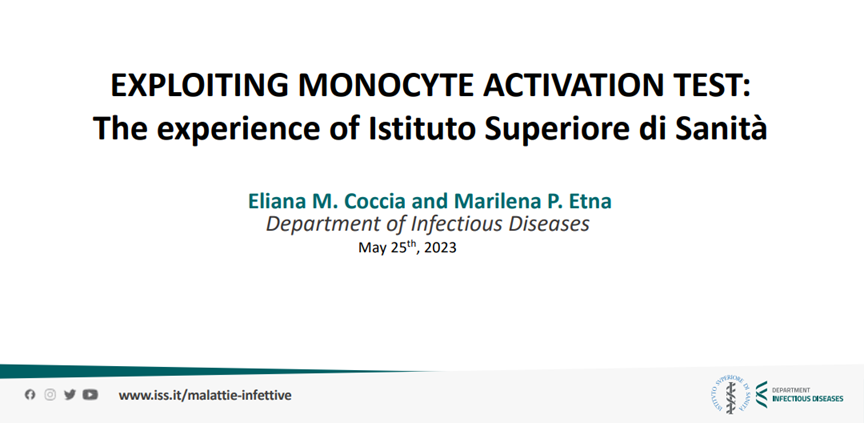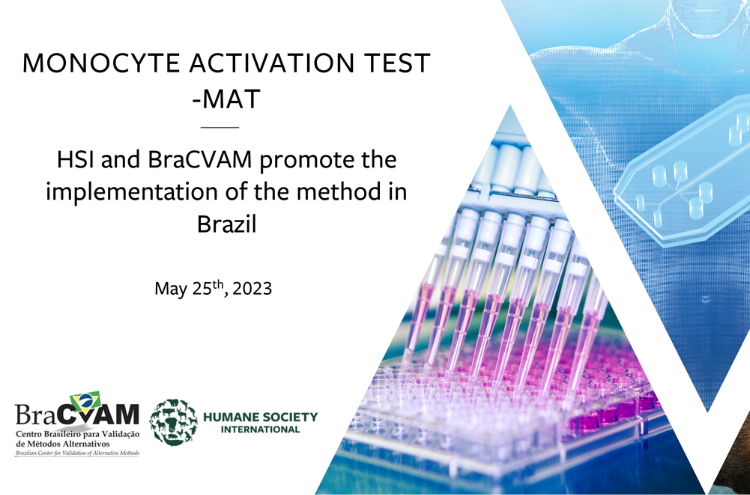The experts from the Italian Institute of Health, Dr Eliana Coccia and Dr Marilena Etna, present their experience with the Monocyte Activation Test and describe how the test is defined within the European Pharmacopoeia and how it has been changing to better support its implementation.

Presentation Slides
Presenter Biographies:
Eliana M Coccia
Research Director, Istituto Superiore di Sanità
Email: eliana.coccia@iss.it
Eliana Marina Coccia is Research Director of the Immunology Unit at the Department of Infectious Diseases, Istituto Superiore di Sanità, Rome-Italy. She received her degree in Biological Sciences in 1984 from University of Rome, working on the effect of type I IFN on the growth and differentiation of Friend erythroleukemia cells. From 1984 to 1985, she was a post-doctoral fellow at the Weizmann Institute of Science (Rehovot, Israel) to clone IFN-inducible genes. In 1988-1990 Guest Scientist at the European Molecular Biology Laboratories (Heidelberg, Germany) to study gene expression and regulation during the erythroid cell differentiation. In 1991-1992 she moved at the Pasteur Institute (Paris, France) to investigate the role of type I IFN on HIV replication.
Research activity: Analysis of B cell response in Multiple Sclerosis; Analysis of the host-pathogen interaction to understand how virulence factors modulate antimicrobial immunity and disease; Analysis of DC-driven immune responses and cytokine expression in the context of bacterial and viral infections; Analysis of altered innate and adaptive immune response in patients with autoimmune diseases; Studies on the IFN–induced gene regulation and transduction pathway in different primary cells, such as T helper type 1 cells, dendritic cells, macrophages, B cells and granulocytes; Effects of IFN on the cell growth and differentiation of different primary and transformed leukocytic cells; Role of IFN in the induction and maintenance of chronic inflammation; Development of in vitro human cell based methods to test vaccine potency and efficacy to replace animal models; Monocyte activation assay to determine the pyrogenicity in vaccine; Analysis of TLR agonists as adjuvant for EBOLA vaccine; characterization of nasal vaccine formulation on human cell-based models.
Regulator activity: Quality assessor of Phase I clinical trial dossier; Expert for Bacterial Endotoxin Working Party at EDQM – European Directorate for the Quality of Medicine; Assessor of dossier regarding experimental procedures and protocols in animal models.
Marilena P. Etna
Researcher, Istituto Superiore di Sanità
Email: marilenapaola.etna@iss.it
Dr. Etna is a Resident Researcher in the Department of Infectious Diseases at the Istituto Superiore di Sanità (Rome-Italy). She holds her Ph.D. in Medical Microbiology and Immunology in 2014 from University of Rome “Tor Vergata” working on the evasion mechanism exploited by Mycobacterium tuberculosis in subversion of host immune response and in particular, on the autophagy process in human primary cells. From 2013 to 2017, she obtained a fellow at Istituto Superiore di Sanità (Rome-Italy) for the identification of novel autophagy-regulated host targets to improve BCG vaccine immunogenicity. During this period, she also carried out a research training in the Unit of Cytokine Signaling at Pasteur Institute (Paris-France) for the characterization of the translatome of human dendritic cells infected with Mycobacterium tuberculosis. From 2017 she obtained a research contract at Istituto Superiore di Sanità (Rome-Italy) to optimize the Monocyte Activation Test (MAT) within the IMI2 VAC2VAC – Vaccine lot to vaccine lot comparison by consistency testing – project. She is currently the expert of MAT assay at Istituto Superiore di Sanità (Rome – Italy) for the batch release of vaccines for human use and in particular for the anti-meningococcal B vaccine. She has been actively involved in training activities on MAT for the Developing Country Manufacturers Network (DCVMN). She has been a member of the NC3Rs pyrogenicity testing focus group. In addition, her research activity focus on Immune-pathogenic mechanisms of infectious diseases and escaping strategies evolved by pathogens; transcriptional profiling of responses to infectious agents; immunotherapy of infectious diseases; development of alternative in vitro human cell-based methods to test vaccine potency and efficacy for the replacement of animal models; implementation of MAT to determine the pyrogenicity of vaccines. She is author of several scientific papers in international scientific journals and conference proceedings.
